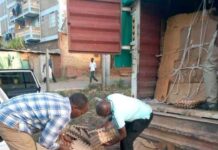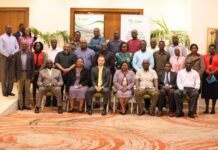The production of low carbon, plant-based insulating blocks by agricultural workers from farm materials could help to support rural economies and tackle labour shortages, experts believe.
A major new study will test if the materials, for use in local construction, could lead to a “Harvest to House” system of building.
The University of Exeter-led study will show if small-scale farmers could diversify into making sustainable building materials for use on their own farms, or for construction in the local area. This could also benefit their own businesses, communities and the environment.
Arable farm workers in the region will be involved in the small-scale trial of a manufacturing process.
Researchers will explore the human, environmental, and infrastructural barriers and opportunities for production through working with farmers and farm workers.
Diversification may be useful to tackle the rural labour shortage which already threatens the viability of
many farms. This project will investigate how diversification into building material production might complement, rather than conflict with, food production.
The project is led by Dr Caroline Nye and Professor Matt Lobley from the University of Exeter’s Centre for Rural Policy Research in partnership with Local Works Studio
The project, “Ag.Lab: Off-Season Farm Production of Building Materials”, grant was awarded from the £3.3 million Ecological Citizen(s) Network+, established in 2023 by UKRI’S Engineering and Physical Sciences Research Council (EPSRC).
Researchers will interview farm and agricultural workers so they can discover challenges faced and identify opportunities for future uses of the system or building materials.
Dr Nye said: “The needs of rural communities are often overlooked in policy decisions and rural poverty is exacerbated by low pay, insecure employment, unaffordable housing and poor public transport infrastructure. Participation and employment in a pioneering, environmentally sensitive new industry, centred in the countryside, could foster a closer engagement of deprived rural communities with the land and bring benefits of a distributed local economy.
“Producing building materials could offer stability to local farm workers who need employment out of season, allowing them to remain in the local area; benefits to the farmer of experienced, consistent, higher skilled workers and repeat ‘returners’ to seasonal work; and stability to farmers who need to find other markets or make more from a crop. This would hopefully translate into more competitive pay for farm workers.
“We hope this project will be a beacon for a new potential cohort of workers – the growing number of young people from non-agricultural backgrounds attracted to the promise of land-based ecological
citizenship.”
The results of the project will be showcased via a podcast series and with a local network of farmers.
Researchers will make a short animated, visual ‘manual’ of the pilot manufacturing system, in an accessible and easy to digest format that can be readily shared and referred to by time-pressed farmers and workers, as well as people outside agriculture.
The project is part of the Ecological Citizen(s) Network+, led by The Royal College of Art, the Stockholm Environment Institute (SEI) at the University of York and Wrexham Glyndŵr University, as well as a range of partners from industry, charities, culture and civil society.









